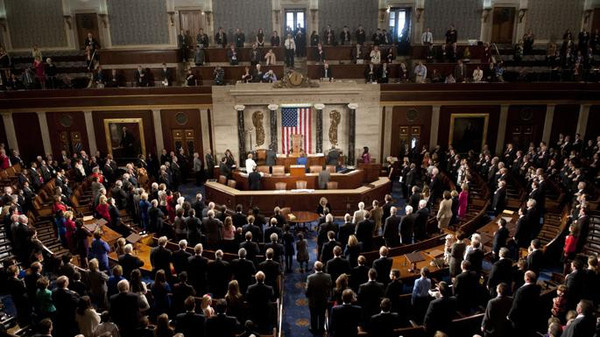U.S. House passes Iran nuclear review legislation
By Reuters | Washington/Thursday, 14 May 2015
The U.S. House of Representatives voted overwhelmingly on Thursday to pass legislation giving Congress the right to review, and possibly reject, an international nuclear agreement with Iran. The 400-25 vote sends the legislation to the White House, where administration officials have said President Barack Obama will sign it into law. The Iran Nuclear Review Act of 2015 passed the Senate last week.
The Iran Nuclear Review Act of 2015 passed the Senate last week, after lawmakers reached a compromise to remove some of its toughest provisions, and Obama dropped his threat to veto the measure as a threat to ongoing negotiations between the United States and five other world powers and Iran. The bill gives Congress 30 days to review a final nuclear deal after international negotiators reach such an agreement, and during that time bars Obama from temporarily waiving any U.S. sanctions on Iran that were passed by Congress. If the Senate and House pass a resolution of disapproval of the deal, it would prevent Obama from offering any waiver of congressional sanctions, the overwhelming majority of U.S. sanctions on Iran. Such sanctions can only be permanently lifted by Congress.
U.S. and Gulf states to deepen military ties
Thursday, May 14, 2015. (AP)
By Staff writer | Al Arabiya News
Thursday, 14 May 2015
President Barack Obama vowed on Thursday to back Gulf allies against any “external attack,” seeking to reassure them of Washington commitment to their security amid Arab anxiety over U.S.-led efforts to reach a nuclear deal with Iran. Obama, hosting the GCC states for a rare summit at the Camp David presidential retreat, pledged that the United States would cooperate with them to address what he called Iran’s “destabilizing activities in the region.” “The United States will stand by our GCC partners against external attack and will deepen and extend cooperation that we have,” Obama told reporters, with Gulf leaders standing by his side at the end of the talks. Obama promised a “concrete series of steps” from the one-day summit as he sought to allay Gulf Arab fears that the potential lifting of international sanctions on Tehran would embolden it in the region and raise the risk of more sectarian strife. Following Obama’s remarks, the Emir of Qatar, Sheikh Tamim bin Hamad Al Thani, said that his country and other GCC states hope that the Iran agreement would be a stabilizing factor in the region. Sheikh Tamim also said that the talks were fruitful and candid in all regional issues.
External threat
According to a joint statement released by the White House, the U.S. said it “is prepared to work jointly with the GCC states to deter and confront an external threat to any GCC state’s territorial integrity that is inconsistent with the U.N. Charter.” The statement, which was obtained by Al Arabiya news, added that: “In the event of such aggression or the threat of such aggression, the United States stands ready to work with our GCC partners to determine urgently what action may be appropriate, using the means at our collective disposal, including the potential use of military force, for the defense of our GCC partners.” Obama and leaders from six Gulf nations gathered at Camp David in an effort to work through tensions sparked by the U.S. bid for a nuclear deal with Iran. Obama is seeking to reassure the Gulf leaders that his country’s overtures to Iran will not come at the expense of commitments to their security.
Non-NATO ally status
On the sidelines of the summit, a White House spokesperson said that the White House was open to the idea of granting its Gulf Cooperation Council partners major non-NATO ally status. But talks at the Camp David summit have been focused more on public assurances about help the U.S. can provide with security, Ben Rhodes said. Obama and the leaders from Saudi Arabia, Qatar, United Arab Emirates, Kuwait, Oman and Bahrain opened their talks with a private dinner Wednesday night at the White House. Just two heads of state are among those meeting Obama, with other nations sending lower-level but still influential representatives. The most notable absence is Saudi King Salman. On Sunday, Saudi Arabia announced that the king was skipping the summit, just two days after the White House said he was coming.
The Saudi king isn’t the only head of state sending a lower-level representative to the summit. The heads of the United Arab Emirates and Oman have had health problems and were not making the trip. The Gulf summit comes as the U.S. and five other nations work to reach an agreement with Iran by the end of June to curb its nuclear efforts in exchange for relief from international economic sanctions. The Gulf nations fear that an easing of sanctions will only facilitate what they see as Iran’s aggression. The White House says a nuclear accord could clear the way for more productive discussions with Iran about its reputed terror links.
















